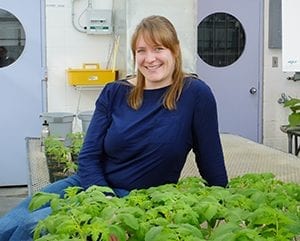News
Liz Brauer Wins Barbara McClintock Award
Liz Brauer, a graduate researcher in the laboratory of Assistant Professor Sorina Popescu and a student in the plant pathology and plant-microbe biology section at Cornell University, received the 2015 Barbara McClintock Award from the directors of graduate studies in the plant sciences graduate fields.
“Liz is an amazing student with a bright future in science,” said Popescu. “The McClintock Award recognizes her diligence, creativity and productivity in the lab but also her qualities as a mentor for younger scientists.”
Winners of the award are chosen because they have made significant contributions to plant science through their research and have “the best potential and greatest background merit.” Brauer will be graduating with her doctorate in May and plans to find a postdoctoral position, possibly in her home country of Canada or in the United Kingdom.
“I would really love to go the academic route,” said Brauer. “I’ve enjoyed my time here and all the cool stuff that we get to do.”
Brauer studies stress signaling pathways in plants, using tomato and the model plant, Arabidopsis. Because plants can’t pick up and move when their environment changes, they need good systems for sensing their surroundings so they can react accordingly. They use a complex system of surface receptors and protein kinases to detect changes in their environment. Specifically, Brauer studies a protein kinase that functions when a plant senses too much salt and when it detects invading bacteria.
“How do plants tell them apart? And then, how do they respond differently to different stresses?” she asks.
Brauer has also served as a departmental representative for Cornell’s Graduate and Professional Student Assembly and helped to create an exchange program with Tokyo University of Agriculture and Technology. As part of this program she travelled to Tokyo and Kyoto in 2011.
Brauer shares the award with fellow graduate student Giovanna Danies. Previous award winners from BTI include André Velasquez in 2012 and Robert Abramovitch in 2005.
The award commemorates the Nobel Prize-winning work of Barbara McClintock, who discovered transposable elements—segments of DNA that can move throughout the genome—while working in maize. McClintock began this work at Cornell University in the 1920s, where she completed a masters and doctoral degree in plant genetics. The endowment for the award came from Robert Rabson, who led the U.S. Department of Energy’s Energy Biosciences Division for many years, enabling much novel plant physiology research.



